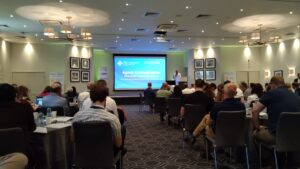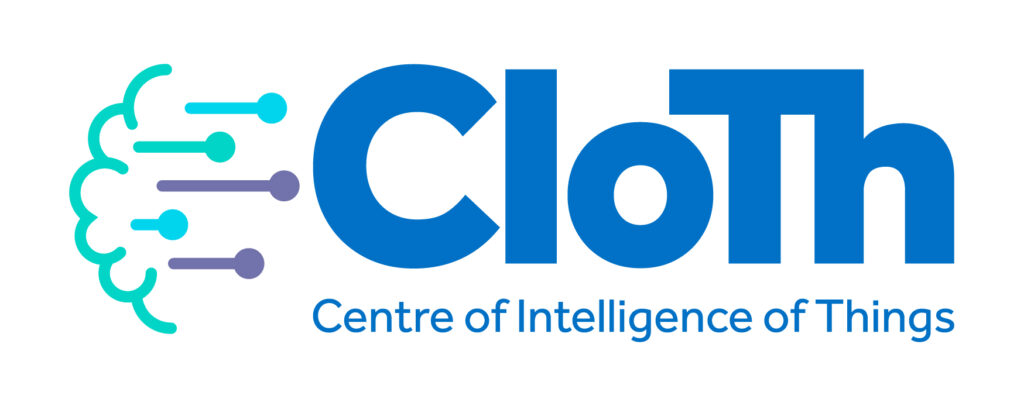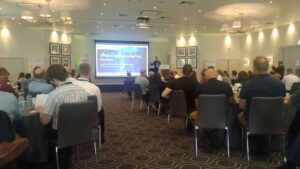Report on Attendance at the “Excellence in AI and Machine Learning” Conference
By: Dr. Anthony Ojo
Date of Attendance: 13–14 May 2025
Location: Staverton Park Hotel & Golf Club, Daventry, Northamptonshire
- Introduction
This report outlines the participation of a delegation from the University of Greater Manchester, Bolton, in the “Excellence in AI and Machine Learning” conference hosted by Oscar Krane. The event brought together professionals and academics across the public and private sectors to explore the advancements, challenges, and future implications of artificial intelligence (AI) and machine learning (ML).
The university team consisted of:

- Prof. Celestine (Head, Centre of Intelligence of Things),
- Salome (MRes student), and
- Myself, Anthony Ojo.
- Travel and Logistical Experience
Our journey commenced from Bolton Train Station, with a transfer at Manchester Piccadilly en route to Rugby. Unfortunately, we missed our scheduled stop at Long Buckby due to a malfunctioning train door, compelling us to alight at the next station and arrange a taxi directly to the venue and arriving at 6.04pm.
Upon arrival, we encountered a logistical oversight: accommodation had been booked for only one individual. It became apparent that event registration should have been done individually rather than as a group, prompting us to secure additional rooms independently.
The return journey on the 14th May proceeded without issue. Departing the venue at 5:27 pm, we took a taxi to Long Buckby, then connected via Rugby, Nuneaton, and Manchester Piccadilly, arriving back in Bolton around 9:00 pm.
- Conference Overview
The conference aimed to address the integration of AI and ML across various sectors, with a particular focus on ethical implications, real-world applications, and strategic implementation. According to the organisers, 88% of industry leaders anticipate increased adoption of AI/ML in the near future.
Key Themes Discussed:
- Bias and fairness in algorithms
- Cybersecurity and data privacy
- Legacy system integration
- Workforce upskilling and job displacement
- Regulatory and ethical frameworks
- Transparency, explainability, and generalisation
- Highlights from Key Sessions
Day 1 (13 May):
- The evening featured a networking dinner and drinks reception, providing a valuable opportunity to engage with professionals from government, academia, and industry.
Day 2 (14 May):
- Dr Robert Moore opened the day with insights into the evolving workplace influenced by AI, asking provocative questions about job futures.
- Creating Staff Avatars in Higher Education: A session relevant to our university context, discussing challenges such as data consent, usability, and adoption.
- AI in Defence Intelligence (Paul Williams): Shared practical insights from AI trials in NATO operations, emphasizing cultural resistance and operational advantages.
- Generative AI Applications (Rob Ellison & Amit Mehta): Explored how GenAI goes beyond tools like ChatGPT, advocating for its role in team augmentation and operational transformation.
- AI Strategy (Razvan Popescu): Offered a framework for integrating AI strategically without discarding established corporate strengths.
- Ethical Use in Education (Rob Howe & Simon Sneddon): Examined the implications of GenAI use among students and faculty, with strategies for mitigation.
- AI Upskilling (Multiverse Team): Addressed the critical gap in AI skills and the cost of inaction in workforce development.
- AI in Policing (Lewis Lincoln-Gordon): Discussed how AI is reshaping law enforcement while maintaining public trust and ethical balance.
- Panel Discussion: Closed with a dynamic discussion on the boundaries and responsibilities in deploying GenAI across sectors.
- Reflections and Recommendations
Attending the conference was highly valuable for gaining cross-sector perspectives on AI and ML, particularly regarding ethical implementation, education strategies, and institutional transformation.
Recommendations:
- The university should explore structured AI upskilling initiatives for both staff and students.
- Lessons from the avatar session may inform digital transformation efforts in our academic services.
- Future conference attendance should ensure individual registrations and clear accommodation arrangements to avoid logistical issues.
- Conclusion
The “Excellence in AI and Machine Learning” conference provided a comprehensive view of AI’s evolving role across sectors. The University of Greater Manchester, Bolton, through its representation, engaged meaningfully with thought leaders, gaining insights that could inform academic and strategic initiatives within the institution.

